

The Athena Project. African Diaspora Consortium. Pbslearningmedia. Teaching about Africa. See also: History: Teaching history K-12 Absolutely WhootieThe stories, for K-12, are taken from books and are revised by children's comments "to best please the audience.
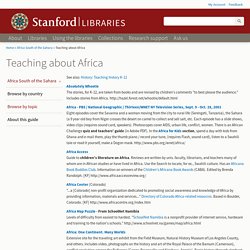
" Includes stories from Africa. Africa - PBS / National Geographic / Thirteen/WNET NY Television Series, Sept. 9 - Oct. 28, 2001Eight episodes cover the Savanna and a woman moving from the city to rural life (Serengeti, Tanzania), the Sahara (a 9 year old boy from Niger crosses the desert on camel to collect and sell salt, etc. Each episode has a slide shows, video clips (requires sound card, speakers). Photoscopes cover AIDS, urban life, conflict, women.
Africa AccessGuide to children's literature on Africa. Africa Center (Colorado)"...a [Colorado] non-profit organization dedicated to promoting social awareness and knowledge of Africa by providing information, materials and services... " Africa Map Puzzle - From SchoolNet NamibiaLevels of difficulty from easiest to hardest. Africa: One Continent. Boston University. Teaching about Africa. Africa's Great Civilizations. Human Prehistory 101 (Part 1 of 3): Out of (Eastern) Africa. The Philosophy of Colonialism: Civilization, Christianity, and Commerce. Overview As the imperial powers of Europe set their sights on new geographic regions to expand their spheres of influence in the 19th century, Africa emerged as a prime location for colonization due to its wealth of natural resources and purportedly undeveloped economies ripe for exploitation.
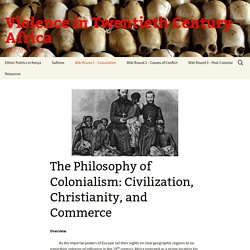
In reality, European colonization devastated traditional African societies and economies. However, the leaders spearheading the movement cited the “white man’s burden,” a term popularized in Rudyard Kipling’s poem to morally justify imperialist expansion. Violence in Twentieth Century Africa. Pre-Rebellion Conditions The first interest for Germany in establishing a colony in East Africa came from Carl Peters who came to East Africa in 1884.
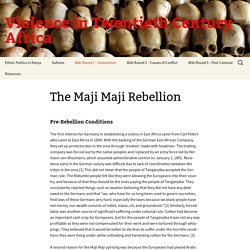
With the backing of the German East African Company, they set up protectorates in the area through ‘treaties’ made with headman. The trading company was forced out by the native peoples and replaced by an army force led by Hermann von Wissmann, which assumed administrative control on January 1, 1891. Maps. Internet History Sourcebooks. Internet African History Sourcebook Africa is both the most clearly defined of continents - in its geography - and the hardest to pin down in historical terms.
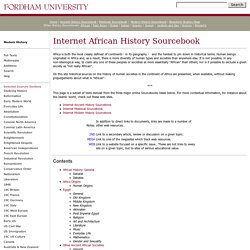
Human beings originated in Africa and, as a result, there is more diversity of human types and societies than anywhere else. It is not possible, in any non-ideological way, to claim any one of these peoples or societies as more essentially "African" than others; nor is it possible to exclude a given society as "not really African". On this site historical sources on the history of human societies in the continent of Africa are presented, when available, without making prejudgements about what is "African". This page is a subset of texts derived from the three major online Sourcebooks listed below.
Five Things You Don't Know About Africa. African History and Culture. Common Stereotypes About Africa. Nelson Mandela La jeunesse – Nelson Mandela Centre of Memory. HIST 359 Homepage. Why 'Brain Drain' Can Actually Benefit African Countries. Survey the world’s campaigns to alleviate poverty and improve people’s lives, and a common thread emerges: People in wealthy countries feel it’s important that people in poor countries stay at home.
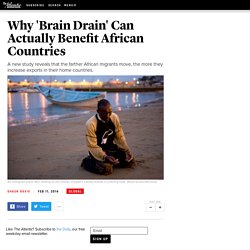
Development organizations in Africa, in particular, receive billions of dollars each year to oversee (often well-meaning and occasionally successful) programs designed to make “life at home” better for Africans—whether through running farms in Rwanda, educating teens in Tanzania, or supporting whole Millennium Villages (at a cost of $12,000 per household).
One could go further and argue that if Africans in one particular state or region migrate or want to migrate, then development in that area hasn’t worked. But a fascinating new paper from the World Bank turns this logic on its head. “Does Migration Foster Exports?” Has a title with an unnecessary question mark. NMNH African Voices: History. "Unless you know the road you've come down, you cannot know where you are going.
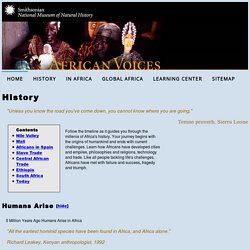
" Temne proverb, Sierra Leone Follow the timeline as it guides you through the millenia of Africa's history. Your journey begins with the origins of humankind and ends with current challenges. Learn how Africans have developed cities and empires, philosophies and religions, technology and trade. Like all people tackling life's challenges, Africans have met with failure and success, tragedy and triumph. 5 Million Years Ago Humans Arise in Africa. Council On Archaeological Studies At Yale University. The origins of urbanism in the Middle Niger floodplain of Mali is a continuing research focus, since the 1970s, of Rod McIntosh.
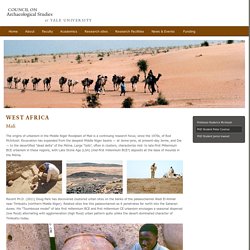
Excavation has expanded from the deepest Middle Niger basins — at Jenne-jeno, at present-day Jenne, and Dia — to the desertified “dead delta” of the Méma. Large “tells”, often in clusters, characterize mid- to late-first Millennium BCE urbanism in these regions, with Late Stone Age (LSA) (mid-first millennium BCE?) Deposits at the base of mounds in the Méma. Recent Ph.D. (2011) Doug Park has discovered clustered urban sites on the banks of the palaeochannel Wadi El-Ahmar near Timbuktu (northern Middle Niger).
Related sites line this palaeochannel as it penetrates far north into the Saharan dunes. Africa Info last 20,000 years. Africa Info It is useful to understand how African environments seem to have changed during the last 20,000 years when looking at the evidence for food production on the continent.
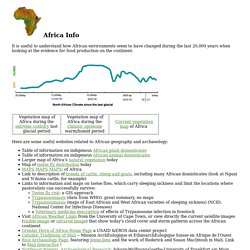
Here are some useful websites related to African geography and archaeology: Table of information on indigenous African plant domesticates Table of information on indigenous African animal domesticates Larger map of Africa's natural vegetation today Map of tsetse fly distribution today MAPS MAPS MAPS! Humaines de l'Universite de Niamey (France) Gajiganna site 2200-400 BC (calibrated dates) Institute of Egyptian Art and Archaeology -- University of Memphis Archaeological Survey in the Eastern Desert of Egypt -- University of Michigan. TRIP DOWN MEMORY LANE: TOPNAAR PEOPLE: THE NAMA-KHOIKHOI PEOPLE ON THE TOP FAMOUSLY KNOWN FOR THEIR !NARA MELON. The Topnaar people are nomadic, cattle-herders and aboriginal Khoikhoi-speaking ethnic group belonging to the Nama, who for their part, also belong to the larger Khoi-Khoi (Hottentots) ethnic group.
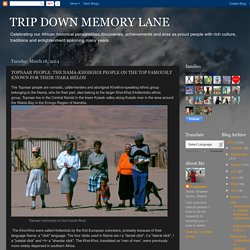
Topnaar live in the Central Namid in the lower Kuiseb valley along Kuiseb river in the area around the Walvis Bay in the Erongo Region of Namibia. Topnaar community on the Kuiseb River. The Khoi-Khoi were called Hottentots by the first European colonizers, probably because of their language Nama, a "click" language. The four clicks used in Nama are I a "dental click", il a "lateral click", ! A "palatal click" and =t= a "alveolar click". Tribal hunt in Tanzania, Africa (Hadzabi tribe) Baka People: Facing changes in African forests. Hunter gatherers - Tribe - BBC. Why is Africa Poor. The long term effects. The spirituality of Africa. One of Jacob Olupona’s earliest memories in Massachusetts is of nearly freezing in his apartment as a graduate student at Boston University during the great snowstorm of 1978.
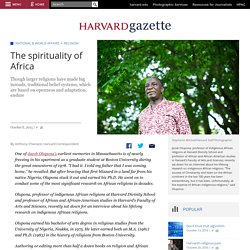
“I had it. I told my father that I was coming home,” he recalled. But after braving that first blizzard in a land far from his native Nigeria, Olupona stuck it out and earned his Ph.D. Precolonial African Religion — Living While Black: Themes in African American Thought and Experience. Spread of Christianity in AfricaClick image for larger viewSource Spread of Islam in AfricaClick image for larger viewSource Precolonial African religions shared the following basic characteristics. Religion was all-encompassing; precolonial Africans integrated religion into all aspects of life. Religions saw the supernatural involved in everything animate and inanimate.
Medieval Sourcebook: Gibbon: The Fall of the Roman Empire. From The Decline and Fall of the Roman Empire, Chapter 38 The Greeks, after their country had been reduced into a province, imputed the triumphs of Rome, not to the merit, but to the FORTUNE, of the republic. The inconstant goddess, who so blindly distributes and resumes her favours, had now consented (such was the language of envious flattery) to resign her wings, to descend from her globe, and to fix her firm and immutable throne on the banks of the Tiber.[1] A wiser Greek, who has composed, with a philosophic spirit, the memorable history of his own times, deprived his countrymen of this vain and delusive comfort by opening to their view the deep foundations of the greatness of Rome.[2] The fidelity of the citizens to each other, and to the state, was confirmed by the habits of education and the prejudices of religion.
The rise of a city, which swelled into an Empire, may deserve, as a singular prodigy, the reflection of a philosophic mind. [[3]] Sallust, de Bell. Jugurthin. c. 4. Africana Age. Africana Age. Implications of research on neglected dimensions of ancient world history. Jesse Benjamin (*) Journal of Asian and African Studies, Nov 2001 v36 i4 p361(22) Full Text: COPYRIGHT 2001 E.J. Brill The exploration of relations between the Nubians and the Nabateans opens new possibilities concerning the historical and historiographic linkages between ancient East Africa and the ancient Middle East.
In large part, such an analysis speaks to the re-mapping of Ancient World relations and the role of anti-colonial historiography in the execution of such a task. Anti-colonial historiography has challenged the presuppositions of the modern political construction of these regions and their interaction. I. In this essay, I revisit historical analyses of ancient "East Africa" and the ancient "Middle East," roughly in the years between 500 B.C.E. and 500 C.E.
The Growth of Pan-African Nationalism 1900-1919. Ras Mekonnen Wolde Michael, the Cousin of Emperor Menelik II, Father of Emperor Haile Sellasie I, the Governor of Harrar Province and De-Facto Foreign Minister of Ethiopia visited several Imperial European Countries in the early 1900’s was the Leading Commander at the Battle of Adwa in 1896 .In the picture, seated in the middle with two British Dignitaries in the 1902 Coronation of King Edward VII -Picture courtesy of Fesesha Dawit , grandson of Kentiba Gebru ( who is standing at the right side of the picture) THE GROWTH OF PAN-AFRICAN NATIONALISM 1900-1919 K.
WESLEY ALFORD, Ph.D. The antecedents to the formal Pan African-Nationalism Movement occurred in the eighteenth and nineteenth centuries. Axum overview: ABC-clio. Nubia: ABC-clio. Modern slavery: Special Reports. Exploring Africa. The Exploring Africa! Curriculum is divided into units, modules, and learning activities. Each unit covers a major topic or theme in the study of Africa, which is then divided into thematic, disciplinary, regional, or country modules. Each module is comprised of learning activities, which are each aligned to the Common Core State Standards.
The learning activities in each module vary in length of time needed for completion. Both students and teachers should feel free to navigate through the units, modules, and learning activities autonomously, or communally with a class, study partner, or teacher. For students, Exploring Africa! For teachers, we offer an Exploring Africa Lesson Plans digital booklet in our store if you want to bring Exploring Africa!
To use the Activity Journal, you will need to have a username and password to login and comment on posts. Unit One: Why Study Africa. African Timelines - Table of Contents. The Story of Africa. Rock Art in Africa - Trust for African Rock Art. Kofi Annan "Africa's rock art is the common heritage of all Africans and all people. Defining and Studying the Modern African Diaspora. The AHA's 1999 annual meeting will have as its theme "Diasporas and Migrations in History. "1 This has been welcomed by those whose scholarly interest and research focus on what has come to be called the African diaspora.
Kingdoms » African Studies Center. A ‘green’ Sahara was far less dusty than today: History of the non-desert Sahara. As recently as 5,000 years ago, the Sahara — today a vast desert in northern Africa, spanning more than 3.5 million square miles — was a verdant landscape, with sprawling vegetation and numerous lakes. 8 Maps That Will Change the Way You Look at Africa: Thematic maps of modern Africa. East Africa Historiography. The Khoisan Once Were Kings Of The Planet. What Happened? : Goats and Soda. Ted Ed. The Atlantic slave trade: What too few textbooks told you - Anthony Hazard. The Atlantic slave trade sent slaves to various locations in the world. What effect did this forced migration have on these areas? Twelve Disciples of Nelson Mandela. Twelve Disciples of Nelson Mandela. World History Connected Africa edition. Africa basic geography quiz.
Sucking Dry an African Giant. Lake Chad has literally gone from being an oasis in the desert, to being just desert. Lake Chad: almost gone - Vital Water Graphics: Solid maps to accompany article. Africa Renewal Online: One plan to replenish Lake Chad. Passengers in Nigeria taking ferries to cross Lake Chad, whose shoreline is receding because the lake is drying up. Earthshots: Satellite Images of Environmental Change. The River Nile Facts. Egypt: The Nile: Then and Now. Niger River: Worst polluted, petroleum. The African Urban Past. Slavery and Remembrance: Comprehensive slavery resource. Ancient Egypt - Menu page.
60 Seconds of Life on the Congo River. Wonders of the African World. African Participation and Resistance to the Slave Trade · African Passages, Lowcountry Adaptations. Slavery overview: Digital History. French primary source justifying imperialism. ARI Counterpoint AfricaContributionFirstWorldWar Download. ColonialTroopsWWl. Video, watch 5:00-end. Promises unfulfilled for African soldiers in WWII. The Africans who fought in WWII. Conference resolution for All-African People's Conference.
The Growth of Pan-African Nationalism 1900-1919. Timbuktu's 'Badass Librarians': Checking Out Books Under Al-Qaida's Nose. Timbuktu, Wahhabism, Islam, libraries. African Laborers for a New Empire: Iberia, Slavery, and the New World.